Dutch culture
The Netherlands is informal, friendly and welcoming. Everyone can feel at home here, regardless of religion, ethnic background or sexual orientation. The Dutch speak many languages and the countryside and cities are easy and safe to travel through, by any means of transport. No matter where you come from, life in the Netherlands will be a little (or a lot) different to your home country. we've highlighted a few points that may help you prepare for your time with us, and to get your studies and semester off to a good start!
Dutch seasons
The weather in the Netherlands is notoriously unpredictable: you can experience cool rainy weather one month – or even one day - and dry warmth the next. This is the reason, you will notice (and join in) when you’re here, that Dutch people tend to complain about the weather.
You will experience distinct seasons in the Netherlands (though we can’t promise the summer will last too long). In general, Dutch summers are relatively warm with some periods of changeable weather, and the winter months are moderately cold with occasional snow. Throughout all of the seasons, the sky can be overcast, so you can expect to see clouds every day. The average temperature in the daytime varies from 1 – 6 degrees Celsius in the winter to 16 – 20 degrees Celsius in the summer.
Innovative
The Netherlands has always looked beyond its borders. As a pioneering trading nation it was doing business with then unknown overseas countries as early as the 17th century. That same enterprising spirit means the country can still compete with bigger economies today. The Netherlands has never stopped evolving. Being small but creative means the country is constantly seeking ground-breaking solutions. For proof of this you need look no further than its innovative water-management and wind-energy systems, or the creativity of its modern industry.
What is it like to live in Holland?
Dutch culture, language, housing, bikes...and of course the weather! In this video two international students from Russia and Mexico invite you into their way of living in Holland.
Due to the selected cookie settings, we cannot show this video here.
Watch the video on the original website orIntercultural communication differences
The Dutch are known for their directness. It is typical for people to say what they feel or think about anything and everything. Although those students coming from a different culture may experience this as confrontational, this characteristic is actually highly valued in Dutch society. Dutch people feel that by being direct, and giving one's opinion straight, situations are clear and transparent, and everybody knows where they stand. Try not to be taken aback by this approach, but view it as information sharing and the starting point of a discussion.
Dutch celebrations and events
Festivals, markets, parades and events are organised throughout the country in every season. Spring mainly offers flower parades and cheese markets. In April you should prepare to get ready for the largest national party of the year: King’s Day (it used to be Queen's Day)! Every year on 27 April the Dutch celebrate King Willem Alexander’s birthday with markets, music and fun fairs.
In summer, there's a wealth of dance, music and theatre festivals. The most popular summerfestival is A Campingflight To Lowlands Paradise. Lowlands is Holland’s most adventurous cultural outdoor event, offering a cutting edge choice of only the best in alternative music, film, stand-up comedy, visual arts, literature and street theatre.
Autumn is the time for art and culture, and Sinterklaas and the Christmas markets bring warmth to cold winter months.
-
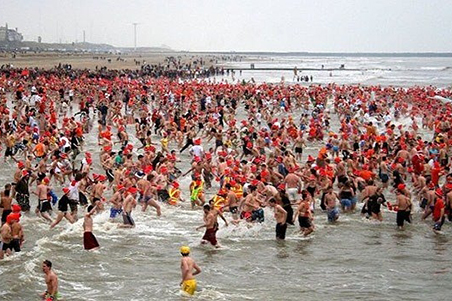
Celebrate the new year with a typical Dutch tradition: a new year’s dip in the North Sea. There are over 200 locations in the Netherlands where you can jump into the sea or a lake. -
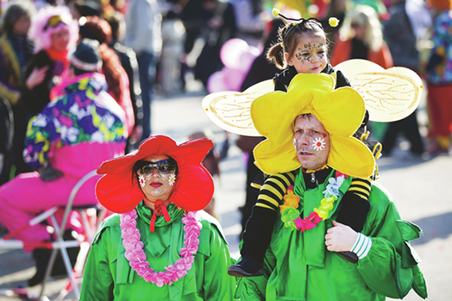
If you can drink, sing and dance wearing a colourful outfit you’re more than welcome to celebrate Carnival in Holland! Make sure you wear a crazy Carnival costume and you’ll blend in perfectly. -
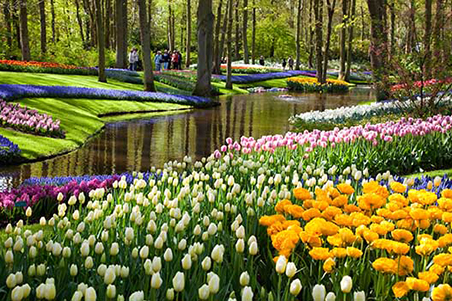
The best place to see tulips in Holland is Keukenhof - a park with 7 million flower bulbs surrounded by tulip fields. -
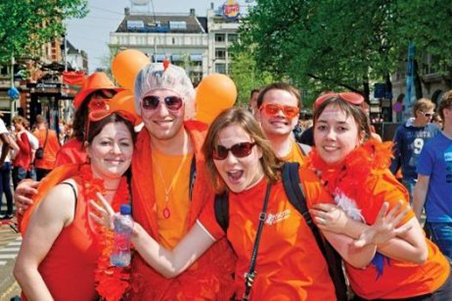
Get ready for the biggest national party of the year: King’s Day! -
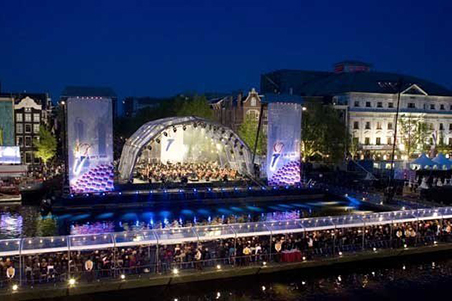
On Liberation Day the Dutch celebrate the capitulation of Nazi Germany. Liberation Day is celebrated on a grand scale with festivals in Amsterdam and in the twelve provincial capitals. -
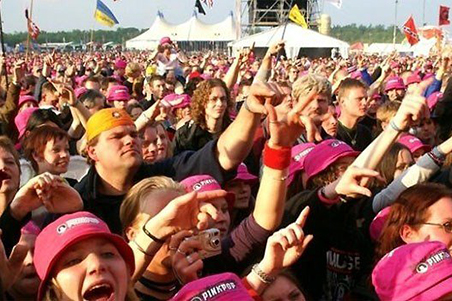
Every year Holland’s biggest open-air festival takes place in the city of Landgraaf. Pinkpop is a multi-day event with different stages where national and international artists put on spectacular shows. -
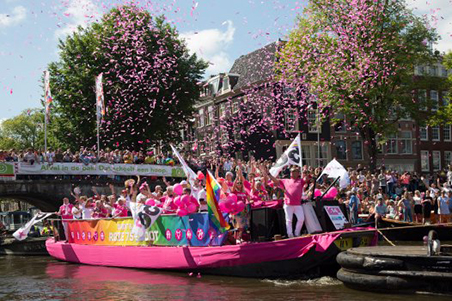
Every year in early August, Amsterdam celebrates the equality of straight, gay, lesbian and transgender people. The Canal Parade is of course the most famous event at Gay Pride in Amsterdam. -
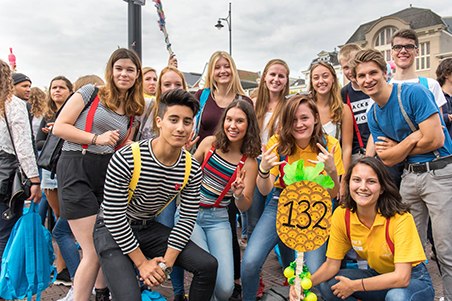
Make your choice! Three introduction weeks for students at Leiden University -
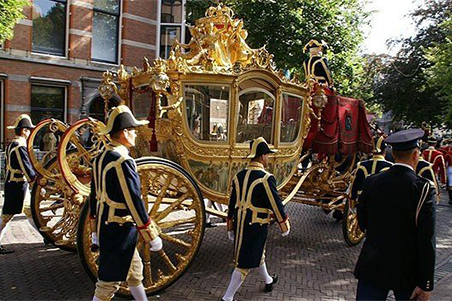
Prinsjesdag or Prince's Day is held every year on the third Tuesday in September. It is an important day in Dutch politics because King Willem-Alexander reads the King's Speech that outlines government policies for the year ahead. -
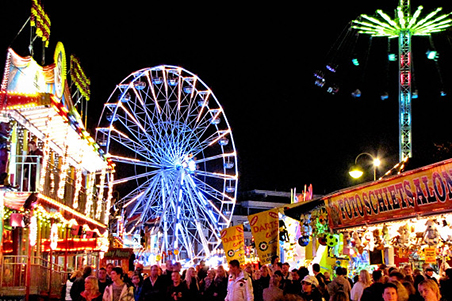
William of Orange gave the city of Leiden the first university in the Netherlands in 1575, it is said in recognition of the city’s courageous resistance against the siege by the Spanish invaders. The great liberation, known as Leidens Ontzet or the Relief of Leyden, is still lavishly celebrated today on 3 October. -
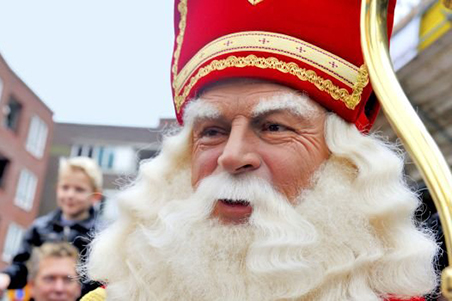
Thousands of children nervously welcome Sinterklaas (Saint Nicholas) in Holland. It's a time to taste traditional sweets such as gingerbread men, spiced biscuits, marzipan and chocolate letters. -
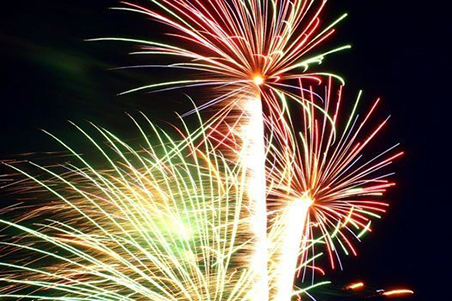
• New Year’s Eve is a big party in Holland every year. Most people spend the evening with friends or family, drinking plenty of champagne and eating the appropriately named ‘oliebollen’. ‘Oil balls’ may not sound appetizing, but they taste delicious. And then, at midnight, the fireworks explode.
Dutch food
A major part of studying abroad or spending time in another culture is experiencing the local cuisine. Dutch food certainly has its delights, but it can take a little getting used to depending on your own culture and cuisine. There are some treats in the Netherlands that you really shoudn't miss:
- Kaas (cheese): the Dutch are known for their cheese, of which there seems to be no end to the varieties available, and it is truly delicious.
- Pannenkoeken (pancakes): you will be astounded by the varieties of pancakes you can order in a pannenkoekenhuis (pancake house).
- Patat (fries): try them with mayonaise just once.
- Hutspot: mashed potatoes, onions, and carrots with a sausage and gravy on top.
- Haring (herring): eaten raw, preferably dipped in onion and lowered into your mouth from some distance above your head, tail clenched in your hand.
- Stroopwafels: delicious Dutch-biscuits, consisting of wafers sandwiching a layer of caramel.
- Kroket: a beef and potato mixture coated in breadcrumbs, then deep fried.
- Drop: this is like liquorice, but so much more. It comes in sweet, salty, and extra salty flavours.
Society
For centuries the country’s historical ties with other parts of the world have brought foreigners to settle in Holland, bringing some of their own ideas and cultures with them. With this history, it's no surprise that the Dutch are generally open-minded and tolerant. Dutch society is currently home to over 200 different nationalities.
Although Dutch is the national language, most people also speak English and often another foreign language, such as German or French.
Biking
Learn the rules of the road. One of the first things you will do in the Netherlands is buy a bike. Cycle paths and routes all over the country are well laid-out and cycling is a wonderful way to get around and see the city or country. For your safety, it's crucial that you learn the rules about right of way and signposting early on. Hesitation tends to confuse traffic situations; again, you need to learn how this works and claim your rightful place on the road (using good common sense as well of course). Take a look at the brochure Road Traffic Signs and Regulations in the Netherlands (pdf) issued by the Dutch government to get you started.

